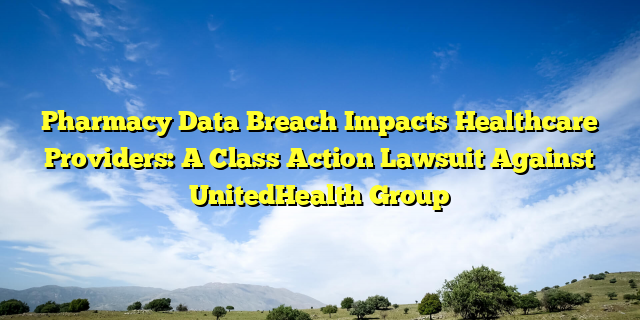The healthcare industry faced a significant disruption earlier this year when Change Healthcare, a major medical billing company and a subsidiary of UnitedHealth Group, suffered a ransomware attack. This attack had far-reaching consequences, leading to the filing of a class action lawsuit against UnitedHealth Group, Change Healthcare, and Optum, another UnitedHealth subsidiary and a prominent pharmacy benefits manager. The National Community Pharmacists Association (NCPA) and numerous healthcare providers across multiple states are plaintiffs in the lawsuit, alleging significant financial losses due to the data breach.
The Fallout of the Change Healthcare Ransomware Attack
The February cyberattack on Change Healthcare effectively paralyzed payment and claims processing throughout the US healthcare system. The lawsuit claims that Change Healthcare failed to implement sufficient security measures to prevent such a breach, misrepresented the robustness of their network security, and caused substantial financial hardship for healthcare providers. These providers faced significant losses due to unpaid services and incurred substantial expenses trying to navigate the disrupted system.
NCPA’s Stance on the Data Breach and Acquisition
NCPA CEO B. Douglas Hoey expressed strong criticism of UnitedHealth Group’s security practices and lack of support for affected members. Hoey emphasized the organization’s initial opposition to UnitedHealth’s acquisition of Change Healthcare, arguing that this incident validates their concerns about industry consolidation leading to inefficiencies and vulnerabilities. The size and complexity of these large corporations can hinder their ability to protect against cyber threats and respond effectively to breaches, as highlighted by the ongoing issues months after the initial attack.
Impact on Pharmacies and Patient Care
The lawsuit alleges that Change Healthcare, Optum, and UnitedHealth Group not only failed to adequately protect patient data but also exacerbated the situation by shutting down the entire system without providing a viable alternative. This left thousands of pharmacies unable to process claims, forcing them to absorb upfront costs and impacting patient care. Many pharmacies had to resort to loans or deplete their reserves to purchase expensive new software to cope with the situation.
Protecting Patients and Holding Companies Accountable
Hoey stressed that community pharmacies prioritized patient care, particularly for vulnerable populations like senior citizens and individuals with chronic illnesses who rely on essential medications. These patients couldn’t afford to pay out-of-pocket for potentially expensive drugs due to the billing disruption. The NCPA argues that it’s unfair to burden pharmacies with the financial consequences of a security breach they didn’t cause. The class action lawsuit aims to hold UnitedHealth Group and its subsidiaries accountable for their alleged negligence and the resulting financial losses suffered by healthcare providers.
Seeking Resolution and Future Prevention
The ongoing impact of the Change Healthcare data breach underscores the critical need for robust cybersecurity measures within the healthcare industry. The class action lawsuit seeks to not only compensate affected providers but also to drive industry-wide improvements in data security practices to prevent future incidents. For personalized advice on navigating healthcare challenges, consult with a healthcare professional.
